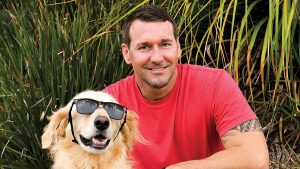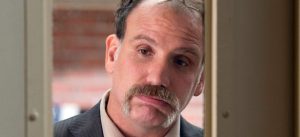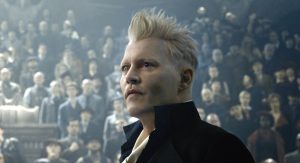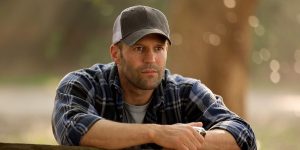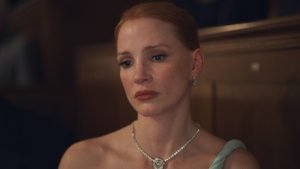
The Jurassic franchise was, clearly, ready for a new era.
The previous Jurassic World film, 2022’s Dominion, garnered the weakest reviews and poorest box office of the sequel trilogy (though still managed to top $1 billion). Some thought Universal’s dino franchise might be put into cryo storage for a decade. But executive producer Steven Spielberg wasn’t ready to let his creation go extinct, and tapped his longtime go-to screenwriter David Koepp to design a new adventure in the saga — Jurassic World Rebirth, which opens this week and stars Scarlett Johansson as a mercenary seeking to retrieve some dino blood samples on a forgotten island that has ties to the original park.
Koepp co-wrote the beloved 1993 first film (based on Michael Crichton’s bestseller) and penned its sequel, 1997’s The Lost World: Jurassic Park. His other credits include 1996’s Mission: Impossible (and has quite an entertaining idea for a new sequel for that franchise, as you’ll read below), 2002’s Spider-Man, 2002’s Panic Room, 2005’s War of the Worlds, and the last two Indiana Jones films.
Spend a few minutes chatting with the bespectacled 62-year-old industry veteran, and you understand why the world’s most acclaimed director has worked with him on roughly a dozen projects. Koepp comes across affable, clever and pragmatically flexible to the sometimes frustrating needs of the industry. But he’s also perfectly blunt about what he thinks will work in a story — or won’t — as well as his own limitations.
“I can only go with what works for me,” Koepp says. “What it works or doesn’t for others, that doesn’t matter. You have to be sincere … You can only write what you can write.”
So you rewatched all the Jurassic movies to prepare for this. What did that tell you in terms of what works and what doesn’t work, in this franchise?
What I was struck by was that every three movies there’s an opportunity to change the tone, characters and ideas. The first Jurassic Park was an incredible feat of imagination. All these movies exist because Michael Crichton had a genius idea, right? The first Jurassic World, okay, that was also a great imagining. So this felt like a license to start with new people and a tone I was comfortable with.
But what was more important was I re-read both of Crichton’s novels — Jurassic Park and The Lost World. Because I was like, “How am I going to come up with stuff that feels new? I’ve done this twice, but it’s been a while.” When I re-read the books, I was like, “Oh, I remember this feeling.” The books are different in tone than the movie Jurassic Park because Crichton’s and Spielberg are very different people with different worldviews. [With Jurassic Park], we did something that was not quite as dark, and certainly hoped it was funny and but still had to be grounded in real science. As I was rereading the novels, I started taking tons of notes, because I was like: It’s all still here.
So Rebirth feels like: Let’s get away from dinosaurs in the real world, and get away from forgetting that dinosaurs are mostly scary monsters, and get away from the idea that velociraptors are your buddies that you go biking with.
Well, I felt like in the in the last film, in particular, they took that idea all the way. Dinosaurs were nesting on the Chrysler Building and renting apartments downtown. I didn’t have a single idea about where to go with that. But I wanted to respect what occurred in the first six movies, because I hate when you watch a franchise movie and they gaslight you and say, “No, that never happened.” Or, “That was a timeline.” I hate that shit. So I said, “No, that all happened, but I want to make them special again. How do we do that?” I wanted us to be back in their environment instead of them in ours.
Then, in re-reading the books, I found the perfect justification. There’s a great speech which I just popped into the script, which was that we think these things are going to live here now, but we forget that this is a different planet. Our landscape is completely different except this narrow band where the environment is somewhat similar to what it used to be [where dinosaurs can survive]. So let’s make dinosaurs exotic and special so that we have to go seek them out instead of, you know, fighting with them over a cab.
Sure, but to give credit where it’s due, you introduced the idea of dinosaurs coming into our world with the ending of Jurassic Park 2, when the T. Rex shows up in San Diego. But also to your credit, you only gave us a brief taste of what that would be like.
Yeah, once you have a T. Rex drinking out of your pool and eating your dog, there’s not much more you can do.
One thing I liked in Rebirth is the movie isn’t overly interested in expanding the franchise mythology. There’s a small percentage of moviegoers who geek out on those details, but most just want a good story where you can stay present and not have to think about random callbacks or heavy exposition.
The working title of the script was Survival. I wanted to keep my eye very much on that with every single character fighting to survive once they get to the island. And the animals, of course, are fighting to survive. So when you got that going for you, don’t need to goose it. These are people trying to not die. That’s a big story.
Speaking of the title, I was really curious about this: Did you consider calling the film Jurassic Park Rebirth instead of Jurassic World Rebirth? Because you’re obviously trying to resurrect of the spirit of the first film and the story has much closer story ties to the original franchise than the World movies.
That would have been a great idea. Where were you? I thought maybe we should have a whole new name, you know, Jurassic Era, something like that. But [choosing the title] was above my pay grade. There are corporate destinies at stake.

Joe Maher/Getty Images
The idea of people don’t care about dinosaurs anymore is also in the film and it seems almost like a meta commentary on trying to relaunch the franchise.
I think they also used that first in the first or second Jurassic World movie too, where they were making gigantic, weird things, because there was idea inflation. So yeah, it’s a little meta. But all these movies are. In the first Jurassic Park, there’s a shot that pans lovingly over the dinosaur pajamas and Jurassic Park lunch boxes in the visitors center — that was actual merchandise that was going to come from the movie. There is a circularity to writing a movie about theme park people.
That reminds me of my favorite shot in Jurassic Park. The CG shot of a velociraptor where there are 1s and 0s reflected on its head from a computer screen below. It evokes not only their genetic creation origins, but also how Jurassic Park was the dawn of the digital age of filmmaking, all in one shot.
Oh, that had that aspect hasn’t occurred to me, but yeah.
Spielberg was apparently heavily involved in Rebirth. It does surprise me a bit that at this point in his career — and with everything else he’s working on — that he would still get out of bed for a Jurassic movie.
I’ve done 10 or 12 movies with Steven over the years, and I think his favorite part is making them up. The part where you say, “Hey, do you think it would be cool if…” That’s the part where I still find him so engaged, whether it’s a movie he’s directing or not. So I get why he would want to — because these are fun. He and I enjoy working together. He the one who started this [franchise]. It’s his. So I think he felt a certain care and responsibility to ask, “How can this go on? What would make it really good?”
What was important to Steven to have in the film?
That it should be scary. We should see some things that we’ve never seen before. Let’s make the science as close to real as we can. And something that is important to him with everything — but in this movie in particular — he really wanted to avoid anything that was a self reference. He does not like to quote himself. He’s allergic to it. If you put something in that rings too familiar, he’ll say, “Didn’t I already do that? Don’t do that.”
That’s interesting as there’s a sequence with your heroes on a boat where they’re hunting a dinosaur that definitely has Jaws vibes.
Maybe a little. But it doesn’t feel like it’s redoing anything from Jurassic. Steven had the idea of, “What if a Mosasaurus was depleting fishing grounds?” Then we ran with the idea. But what I loved was this you wouldn’t expect is a 25-minute sea going adventure in the middle of this movie. I felt like it was kind of Creature from the Black Lagoon — a bunch of people on a boat go looking for something weird. I find that sequence exhilarating. It’s beautifully shot and acted, and gorgeous to look at. It had scope and awe — which was another thing that was important to Steven to recapture, if possible. Because there are moments where you feel moved by how beautiful dinosaurs are, and that they’re majestic, but we can’t forget they should also be very scary and sometimes want to eat us.
I remember seeing that original film as a kid and thinking, “That was amazing, but I can’t believe they didn’t have the raft scene from the book.” So it’s no surprise that’s my favorite sequence in the new film. That had to be satisfying to finally get to add that.
You know when you have to sneeze and you can’t? I’ve had that feeling for 32 years about the raft scene. In the first movie, Steven and I had talked about it. I think he’d storyboarded it. And I had put it in the very first draft. It quickly had to get dropped because it didn’t quite fit the structure, and it definitely didn’t fit the budget. Also, in 1992, doing CG water was still really hard. Showing a T. Rex in the first place was going to be groundbreaking, and nobody knew if we could do it or not. Doing a T. Rex swimming was off the table right away. So it was enormously satisfying to put that in. When I wrote it for this movie, I was almost just transcribing what’s in the book, because it’s a perfect scene.
Scarlett Johansson did a great job. So I read the character was originally written to be gender neutral? (Director Gareth Edwards suggested this in an interview).
No, she was always a woman. What self-respecting writer would write: “A character — and I can’t tell you what kind of person she is”? You gotta make some choices. But yeah, she was great. I try not to think about actors when I’m writing the early drafts. But I didn’t dare to think of her anyway because she’s a very popular actress. She the only person we talked to, and urgently wanted to do it. She also had some really savvy notes, which I was happy to implement. She’s so comfortable with the action and running and sliding and screaming and looking scared and being mad — all things that you have to do that are hard in these movies. You have to be physically capable. My favorite moment of hers is she’s rappelling down a cliff, and she zips into the frame and says, “It’s fun, isn’t it?” and then keeps zipping out of frame.
What were couple of her notes?
I wish I had something great to offer but I can’t remember specifically. But when a good actor comes in, they behave like their character’s lawyer. They say, “I don’t believe my client would do that,” or, “My client is underrepresented in this portion.” And you’re like, “You’re right, for 14 pages I kind of forgot about her.” Then you go through and you do a draft looking at it solely from that character’s point of view. It really liberates you, because you’re not balancing everybody’s needs, you’re just thinking about that one character. I felt like her character got a lot better.
Without giving away any spoilers, it’s fair to say the film’s ending doesn’t leave you with a cliffhanger to set up a new trilogy. I liked that it was very, “Here’s the end. If we do more, we’ll let you know.”
That was a specific conversation we had. Do we need to throw to the future in this? I thought occasionally about planting a little something here or there that might be helpful. But honestly, it’s a bad idea to do that, and they’re the first things to [get cut from a script] if they’re remotely in the way. It is so hard to make one good movie — speaking as someone who’s both succeeded and failed at making a good movie. There are so many ways to go awry. Thinking about the future is like the dumbest thing you can do. So it was: Let’s make this work. If it works, people will like it. And then maybe there can be another one.
Going back to the first movie, two famous changes in the original film from the book is that both Ian Malcom and John Hammond live. I always thought Hammond arguably should have died. But curious, as the writer, did you agree with both those changes or were they Spielberg’s?
I was in favor of both those. When we started discussing our tone at the very beginning, we decided our Hammond is a bit more of Walt Disney than the more selfish, dark character that he is in the book. You can kill him in the book because he’s got it coming. The character in the movie is misguided. The worst thing he does is he’s a bit doddering. Ian Malcolm I was never going to kill, because I love that guy. He’s so useful — funny and smart and carries the science.
You’re also the writer on Steven’s intriguing new UFO project. What can you tease about that one?
I can say that we’re going with a really snazzy title, Untitled, at the moment. It comes out in June. That’s all I’m supposed to say.
Okay, let me ask this then: Did the events depicted in Close Encounters of the Third Kind also occur in the world of this film?
Like I’m going to answer that. Sorry Woodward! You’re trying to trick me into confirming something that I don’t want to confirm.
Fair enough. You also have the sci-fi movie Cold Storage coming up (which stars Liam Neeson, Joe Kerry and Georgina Campbell and is about security guards trying to stop a deadline fungus before it destroys humanity).
That I can talk about that. It’s based on the first novel I wrote. Comes out in February. I think it turned out wonderfully and I’m very happy with it. It’s horror movie that’s very funny and rather sweet — that’s a hard balance to hit. But the director, Jonny Campbell, and the terrific cast really got it.
Indiana Jones franchise. That’s done, right?
Well, I don’t see it continuing. Everybody made it pretty clear. Harrison was like, [Harrison Ford impression] “Yeah, I’m done.” So it would need to be somebody’s brand new idea about how to come at that. I’d watch it as a streaming show. Streaming is perfectly suited to a serial adventure, which is what Indiana Jones was. He could have a season-long goal and you don’t have to wrap up the story every week like with The Young Indiana Jones Chronicles. But I think their plan is to just let it be for a while.
Speaking of being done: Tom Cruise suggests he’s done with Mission: Impossible. You co-wrote the first movie. What do you think Paramount should do with that franchise?
This is something [the first film’s director, Brian De Palma] and I have talked about. I know exactly what they should do, and I would be happy to write it. I think that they should make a film with Tom playing that character that opens with a great, big extended action sequence. He gets himself in a terrible pickle. He fell off a rocket. How’s he gonna get out of this one? He’s falling to Earth. He’s pulling out Swiss Army knives. He’s spreading his skin out to slow his fall. Doing all sorts of clever things. But it’s all for naught because he smashes into the ground and dies. The film ends. It’s a 16-minute film.
#Jurassic #World #Rebirth #Writer #David #Koepp #Interview

